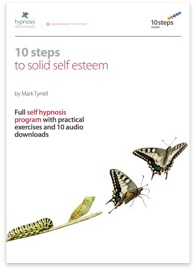44 Tips to Boost Low Self Esteem
Feel better instantly with these fast-acting self esteem tips from Mark Tyrrell

Over the last 20 years I've written a lot about low self esteem all over the internet, and I've trained thousands of health professionals in my approaches too. I thought it might be useful to collect some of the most popular tips in one place. So...
What is self esteem? It's a measure of how you think and feel about yourself in relation to other people. If you always imagine other people are 'better' than you, you will be likely to lack confidence, feel anxious, and generally think negatively. This is actually unfair - to you! It means that you can't really give of your best, and may find life more of a struggle than it needs to be.
Onto Tip #1...
1. What causes low self esteem, anyway?

There are more theories about self esteem than there are leaves on the tree outside my window, but if there's one thing I know after 15+ years of helping people with low self esteem, it's this:
Low self-esteem almost always results from how we are conditioned by other people.
If you were systematically insulted, criticized, or bullied, then you are more likely to have absorbed the negative messages about yourself from other people. Particularly if you were young when it happened.
Think about who these other people were and when you feel bad about yourself, take a moment to ask yourself: 'Hold on. Whose voice is that in my head?'
I bet it belonged to someone else originally.
Starting to override other people's conditioning of us is the first step to psychological independence; the real 'you' (that you should be listening to) can be much kinder and more reasonable about yourself.
2. But what is low self-esteem?
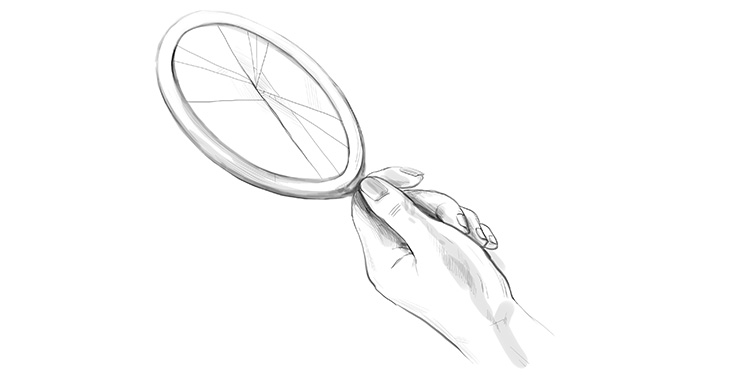
Please take a moment to read this next sentence.
Low self-esteem is a false perception of oneself.
OK. Now please go back and read it again.
Did you get that?
If you have low self-esteem then you are better than you think you are.
This is the definition of low self-esteem.
When your self-esteem improves, it's because your self-knowledge has improved; just as the ugly duckling in Hans Christian Anderson's famous tale had to learn its true nature before it could become fulfilled.
But how do you tell if your self-esteem is too low?
We'll get to that next tip. For now, go back and read that one more time.
3. What are the signs of low self esteem?

Contrary to popular belief, healthy self-esteem doesn't mean loving yourself no matter what you do.
Shame, guilt, and self-reproach do have a place if we behave badly.
It's just that those with true low self-esteem tend to feel these things even when they don't behave badly.
People with genuine low-self-esteem tend to treat themselves badly, so ask yourself, do you feel:
- You are morally worse than most other people?
- That you have less appeal than most other people; that you are uglier?
- You are stupider than most other people?
- You're unlovable?
You might also feel:
- Like never spending money on yourself or your looks because you feel you 'don't deserve it'.
- Your opinions aren't as valid as other people's opinions.
- Your low self-esteem is holding you back from really doing what you want to in life.
4. A diamond doesn't know its value to others
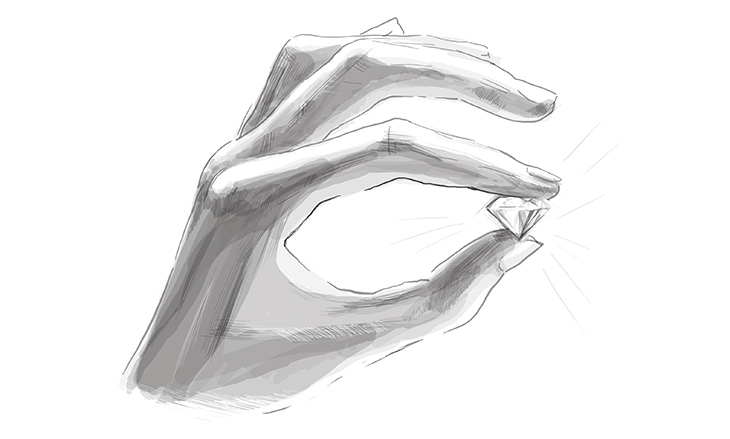
I wonder if you can identify with Joy...
The doorbell rang. She was perfectly on time. The first word she uttered was, 'Sorry!' She said the S-word three more times before we even got to my consulting room. Later, Joy told me she sometimes felt apologetic for existing.
She'd had therapy before and been diagnosed with low self esteem, but had unhelpfully been told to 'start loving yourself'. She told me (apologetically), 'The trouble was, he kept telling me to love myself but he didn't really tell me how to.'
Joy needed practical help.
I'm going to tell you how I helped Joy over the next few tips. What I can tell you now is that she felt a lot better by the time she finished therapy using the same approaches I use in our 10 Steps to Solid Self Esteem course.
For now, remember one thing.
A diamond doesn't know its value to others.
5. Are You Spreading Bad Stuff About Yourself?
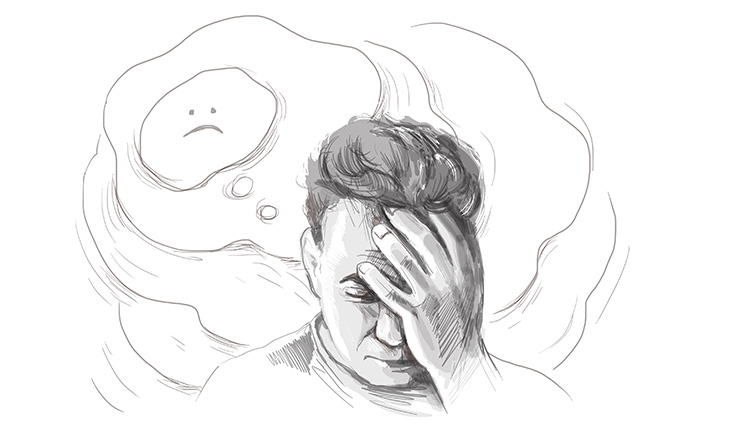
Here's one thing that almost every person I've treated for low self esteem does (including our friend Joy above):
They take a specific negative incident, situation, or trait and generalize it to everything.
This is important to understand so you can spot yourself doing it, so here are 3 examples to fix it in your mind:
Example 1:
A) Suzy burns a meal she's prepared for her kids
B) She generalizes to: 'I'm such a lousy mum, I can't even cook a meal!'
Example 2:
A) Jake fails a maths test
B) From this he negatively generalizes to: 'I'm so stupid!' - (then, even worse) - 'I can't do anything right!' We've magically gone from failing a maths test (specific) to being a failure at everything (pretty general!).
Example 3:
A) Samantha really likes a boy in her class but is too shy to speak to him. She is mortified when he asks her best friend out.
B) She generalizes this specific incident to: 'I'll never get a date; no one will ever like me!'
In psychology speak, this is known as 'globalizing' and if you do this for negative things, you'll feel bad about yourself.
Knowing you are doing it is the first step to challenging it.
If you catch yourself doing this then force yourself to find examples that contradict your own negative blanket statement. It's an effort, but it's so very worth it.
6. Will you please be fair to yourself?
Low self esteem makes us magnify failures and personal faults.
It also makes us minimize or completely discount successes and personal strengths.
Don't do this.
Be fair.
If other people say you are attractive, clever, kind, fun, or whatever, respect them enough to at least consider that what they say is a probability.
Remembering and dwelling on criticisms while discounting and forgetting compliments (or any positive feedback) is a very biased, off-balance way of travelling through life.
7. Are you sucking the satisfaction from success?
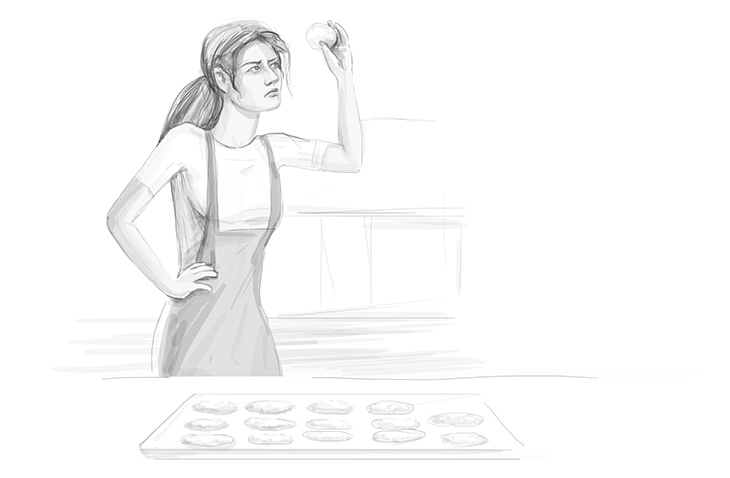
Is there any chance you feel like this sometimes?
'If it's not perfect then it's a total failure!'
In my years as a therapist I've found this is a very common approach to life taken by people with low self esteem and general anxiety.
The idea that something is 100% useless unless it is 100% perfect, is a trap.
Low 'self esteemers' often see things in very all-or-nothing terms. 'That family is just perfect! I'm just useless!'
Of course nothing in this world is perfect and no one is entirely useless. To stop this destructive black-or-white thinking, do this:
Think, 'If 100% is perfect and 0% is 'total failure' or 'totally useless!', how do I rate the meal I cooked?' This forces realism.
You might only give yourself 20% for the meal or your speech or whatever, but then look at that 20% and ask yourself: 'What enabled that 20%?'
And 'how can I build on that to get to maybe 25%?' This breaks down the perfect/disaster thinking which drives and maintains low self esteem.
Learning to assess yourself in a more balanced way is vital for ongoing solid self esteem.
8. What makes up solid self esteem?
We've been talking a lot about low self esteem, but we really need to know what makes for solid self esteem. After all, if you don't know the destination, how are you going to get there?
Healthy self esteem consists of:
- Honest respect for your own abilities, potentials, and value.
- Knowing your strengths and trusting in them.
- Appreciation and open acceptance of your limitations.
- Acceptance of these limitations whilst understanding that some limitations can be overcome.
- Freedom from being overly concerned with what we imagine others think of us. Whilst accepting these perceptions do play a part in everyday life, remember they do not determine who we are.
As I mentioned before: a diamond doesn't know its own value, but it is still a diamond nonetheless. Remember that.
9. Disapprove of others' disapproval
Have you noticed that some people use disapproval as a weapon?
If you've had what amounts to a phobia of disapproval, then such people will scare and therefore control you if you play their games.
Seeing reality through a narrow and prejudiced lens of 'does this please or displease me?' makes people pretty tyrannical.
People who are quick to disapprove (even if they just imply disapproval) can make you on edge, to say the least.
Focus on what you think and want. If someone seems to disapprove, call them out on it. Ask them what their problem is. As weird as it sounds, you have every right to disapprove of their disapproval!
Ultimately, disapproval fails to deliver what it threatens. When the 'bomb drops', you learn there is no bomb. When you let people disapprove of you if they want and cease to worry, a whole new world of personal possibility opens before you.
10. Are you comparing your inside to others' outsides?
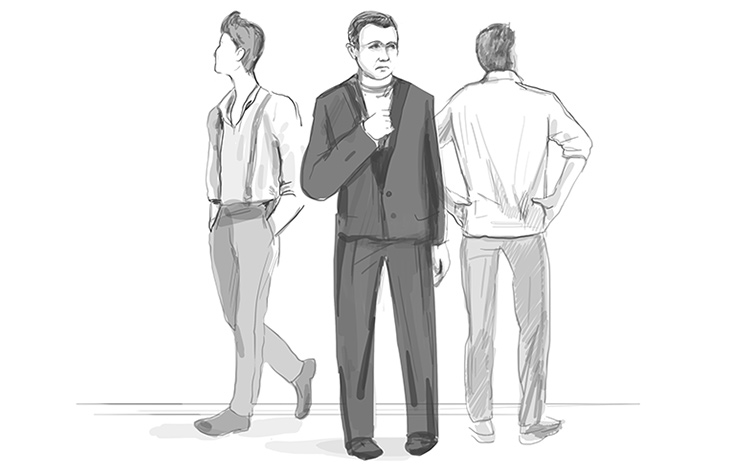
Here's a really common thing - feeling like you're not as good as others.
Do you think that perhaps the people you think of as the 'best' also have people that they feel inferior to?
Here's one way around this trap...
We need to distinguish between knowing and feeling.
For example, I know I am inferior to Bill Gates financially, to Stephen Hawking intellectually, to millions of men aesthetically; but this knowledge doesn't bother me one iota.
Knowing you're inferior in some ways is very different from feeling inferior.
Knowledge that you might sometimes compare unfavourably to others may just be insight and perception. It's crazy to try to pretend that we are all as good as each other in all ways. (The 'self-esteem industry' has been guilty of this ridiculous artifice.)
There's one little quote I like to remember for this problem:
"Don't compare your inside to other peoples' outside"
It's such a common problem, I've got a session called "Stop Comparing Yourself to Others", which is also part of the 10 Steps to Solid Self Esteem course.
11. Here's how to stop feeling inferior
As I said above, one way to get over feeling bad because others are 'better' than us is to realise that this is no bad thing. We can know we're inferior in some ways without this making us feel bad.
So here's what to do if you find yourself feeling inferior to someone.
Ask yourself: "Okay, exactly who do I feel inferior to?" Narrow it down. Emotional thinking is always sloppy, so tighten it up to make it less emotional.
There are close to seven billion people on this planet (last time I counted). What kind of person do you feel inferior to? Rich people? Good looking people? Very academic people? People you view as accomplished? Most people aren't these things.
Now get even more specific; name names to yourself. "Actually, I feel inferior to Bob down the street." Why? How, specifically, is Bob better than you?
So from 'feeling inferior' we've gone to 'feeling inferior to specific types' to 'feeling inferior to Bob down the street'.
Now ask yourself in what ways Bob isn't superior to you. Does he have your humility? Wit? Life experience? Compassion? Emotional intelligence?
If we are too narrow with what constitutes 'good' or 'successful', then we're more likely to come off feeling worse. Believe me, 'Bob' has issues of his own.
12. Are you really being you?
It's so freeing when you give yourself permission to be yourself.
No one has written on his tombstone: "Here lies Ralph; he was quite like John."
All Ralph can be is Ralph (or the best possible version of himself); he ain't ever gonna be John.
Wanting to be someone else is okay(ish) when you're fifteen. But how can an impersonator ever be true to themselves? Being inspired by someone else means assimilating some of their traits into who you are. It doesn't mean trying to have their exact same life.
Low self esteem thrives on people wanting to be someone they're not. This doesn't mean we have to limit ourselves as to what we can do, but it does mean that we can get by much better when we don't try to be someone else.
13. Square peg, round hole?

Do you remember Anderson's tale 'The Ugly Duckling'?
In it, a young swan felt a failure as a duckling because, well, it wasn't really a duckling, was it? How could it be a successful something that it was not?
If you feel inferior, imagine for a moment how you'd need to be to feel great about yourself. What would you need to look like, to own, to be doing?
Now reflect: Would all of that really be you? Or would it be like a swan posing as a duck?
14. Why perfectionism wrecks self esteem
- "If only my nose was straighter... then I'd be confident and happy!"
- "If only I earned ten thousand more a year...then my life would be good!"
- "If only I could be exactly the same as Bob...then I'd feel great about my/himself!"
Have you ever thought like that?
Of course life doesn't work like that.
Because much of what we feel inferior about is relatively superficial; the non-superficial part of us will always feel left wanting by external band-aid remedies.
Sure, you might have more confidence with a straighter nose for a while, but you are much more likely to forget about comparing yourself to others (either favourably or unfavourably) when you live your life in a sustainable way that utilizes your real core character strengths, values, and personal ideas.
15. Is self forgiveness a problem for you?

Many people I have helped with self esteem issues have problems with guilt, or shame over something they've done in the past.
And so I have had to help them forgive themselves in order to move on.
Self-forgiveness doesn't mean making excuses; rather, it's about finding understanding. So ask yourself: What state were you in when you did that thing? When we are very emotional, we are, for a short time, 'not in our right mind'. Were you:
- Unduly stressed?
- Not in full possession of all the facts?
- Acting from the position of having suffered a very difficult past?
Again I'll emphasize mitigating circumstances aren't excuses but possible causes for past actions.
And if you need a little help in this area, try my Forgive Yourself session.
16. Are you being blackmailed?
Continuing on our topic of self forgiveness, think whether you've found it hard to forgive yourself because other people have had trouble forgiving you.
Consider: Are they using this as psychological blackmail with which to manipulate you?
One couple I helped involved a husband who himself had been unfaithful many times throughout his marriage. He found out his wife had had a brief affair and now, years later, still used it against her daily, pushing her 'guilt buttons'.
Have you found it difficult to move on because someone else is trying to stop you? (Here's how to handle a guilt tripper).
Remember you were and are only human.
The world will be a better place if you can move on from guilt and use your freedom to make more of a contribution to your community.
17. Are you going to 'pay' forever?
If you feel guilty for something you did, ask yourself: "Did I mean to cause pain to others or myself?"
None of us can always foresee consequences to our actions. Consider whether you meant to harm others, because we can all make mistakes.
What you meant to do and the effects of what you did may have been sharply at odds. If you did mean to harm others, then consider this...
When's your release date?
If you'd been 'convicted' of what you did, what would your punishment have been? And when is your punishment due to end, do you think?
18. Reinventing yourself

No matter what you've done, you can make a good life for yourself and others. Here's a story that shows what I mean...
In the 1960s, British politician John Profumo caused the so-called 'Profumo affair', which led to his own resignation and possibly the fall of the government at the time. But in the decades after this scandalous disgrace, all the way to his death, he did so much good.
Shortly after his resignation, Profumo began working as a volunteer, cleaning toilets at a charity hall in London.
He worked there for the rest of his life, eventually becoming chief fundraiser, raising large sums of money for the organization and totally turning it around.
The social reform campaigner Lord Longford said he "felt more admiration for Profumo than for all the men I've known in my lifetime".
We don't have to be defined by one act or even one period of our lives. In the same way that a person shouldn't rest on their laurels after one heroic act of goodness, feeling that now they don't have to make any efforts, a person shouldn't base everything on one action or one part of their life.
Here's to reinventing yourself.
19. What would happen if you spoke your mind?

The next few tips are going to be along the theme of 'approval seeking' (or always wondering what other people think of you).
Some approval seeking is inevitable of course - after all, we all need friends.
But if we are led through life doing what we've come to believe is 'expected of us', then, in a way, we cease to exist, to live, and be real.
One way to make a start on this is to try speaking your mind.
Not always, of course, but why should it always be you who has to 'tread carefully'?
Start practicing speaking your mind a little more and let the 'consequences' sort themselves out.
What you'll find is that most of the time no one is offended at all - and, as long as you don't set out to hurt others, if they are upset it's only because you've started behaving in a way that lets them feel they have less 'power' over you.
20. Are you comparanoid?

Let's face it, most of us compare ourselves to others.
Mass media beams in the finest looking, richest, and most talented people into our lives 24/7.
This creates the illusion that we 'know' all these beautiful, clever, younger, athletic, rich, able people.
Because we compare ourselves to people we know, this illusion of knowing air-brushed 'have-it-alls' can make us feel correspondingly worse about ourselves.
The trouble is, we may compare ourselves unfavourably.
Yes, I know Eleanor Roosevelt (bless her) suggested that no one can make us feel inferior unless we allow them to, but...oh, great! Now I feel inferior and it's my fault because I'm allowing it to happen.
For now, you can catch yourself when you do this, and start to avoid the sources of the problem, like certain TV shows and magazines.
And remember this line from the beautiful poem Desiderata...
If you compare yourself with others, you may become vain and bitter; for always there will be greater and lesser persons than yourself.
There's simply no way to win the comparing game.
The session 'Stop Comparing Yourself to Others' is part of our 10 Steps to Solid Self Esteem course, in case that helps.
21. Please yourself! No really...
Constantly seeking approval means we're perpetually worried that others are forming a bad opinion of us.
We come to feel vulnerable and prey to whether other people are pleased with us or not.
This steals the fun, creativity, and spontaneity from life.
Make a point of doing stuff now and then purely because you want to. This is not being selfish; it's letting other people know that you're a multi-dimensional person with your own tastes, ideas, and enthusiasms.
I've got a download that will help you get out there and try new things.
22. You are not in the business of mind control, are you?

You may have spotted this, but anxiously seeking approval is often an attempt at trying to gain and keep a sense of control.
If we can just make people 'happy' by being what we imagine they want us to be, then we won't be rejected or abandoned.
That's the common assumption; but does it work?
Well, people like 'nice' people, for sure; but, paradoxically, trying to be all things to all people can make us less appreciated, because people are generally drawn to an aura of self confidence.
So remind yourself regularly that you can influence other people's perception of you some of the time, but you can't control it.
People tend to think what they'll think. (Did I mention I have a session called "Stop Worrying What Others Think"?)
23. What you think is right
If you had lived in Nazi Germany as a non-Jewish blond-haired blue-eyed person, to seek approval from people around you (the ruling Nazi party) you would have to have done and believed some monstrous things.
Peer pressure can make us go against what we truly know to be decent and civilized behaviour.
Pack mentality can work on any scale. The 'leader' decides what is 'right and wrong', and the followers sometimes comply to impress the leader and others or because they are afraid of the consequences if they don't.
This is obvious in a huge cult like Nazi Germany or in lesser cults, but it happens much more in day-to-day life than many of us realize.
Focus on what you believe to be right in situations, rather than what peer pressure may lead you to do. Be your own person. Resist peer pressure.
24. What do people really think of you?

I've noticed that people who are overly concerned with approval assume that other people will think them 'a terrible person' or 'a loser' if they say or do something that isn't somehow right.
But most people don't make heavily judgmental decisions about other people based on a few words or even actions.
Constantly worrying that someone else is inwardly going to condemn you as an 'awful person' is overestimating the 'black or whiteness' of other people's perceptions of you.
I might sometimes be baffled or surprised (or assume I have misunderstood them) when someone says or does something, but I rarely conclude: "She/he is a terrible person!"
As we know, generally good people can do bad things. If you're around people who do make blanket, negative, and premature assessments of you based on a few words or actions, then you need to remember that is all about them - not you.
And you might want to reconsider your choice of companions!
25. Disapprove of others' disapproval
Have you noticed that some people use disapproval as a weapon?
If you've had what amounts to a phobia of disapproval, then such people will scare and therefore control you if you play their games.
Seeing reality through a narrow and prejudiced lens of 'does this please or displease me?' makes people pretty tyrannical.
People who are quick to disapprove (even if they just imply disapproval) can make you on edge, to say the least.
Focus on what you think and want. If someone seems to disapprove, call them out on it. Ask them what their problem is. As weird as it sounds, you have every right to disapprove of their disapproval!
Ultimately, disapproval fails to deliver what it threatens. When the 'bomb drops', you learn there is no bomb. When you let people disapprove of you if they want and cease to worry, a whole new world of personal possibility opens before you.
26. Do you care too much what others think?

"Why should we worry about what others think of us, do we have more confidence in their opinions than we do our own?" - Brigham Young
I've met people who don't care at all what others think.
These may be lovely people in some ways, but they tend to do to social situations what, say, an unseasonable heat wave might do to the Winter Olympics.
Still, in some ways you can envy them. Never seeming to care or even consider what others think of them - oh the freedom!
But really we want balance. To be 'emotionally intelligent', we need to have some awareness and consideration of what others may be thinking of us whilst not caring so much that it prevents us being effective and original human beings.
One of my first ever clients, John lamented that for fifty years he'd felt unable to do what he wanted to do. He'd joined the family business because he feared his family would think ill of him if he followed his passion for music.
He said he'd always been afraid of doing, saying, or even thinking his own thing. By the time he came to me, he even had the feeling that people were judging him when he walked down the street. "It's as if my clothes, the way I walk, everything is all wrong somehow."
John knew consciously that other people weren't solely focussed on him, he knew that his views, wants, and ideas were as valid as anyone else's; but that's not how he felt.
I asked him the ten million dollar question: "What would you really like to do, John?" He paused, looked doubtful, then a shy smile emerged, followed by a bigger one: "You know, now the kids are grown up, the wife and me, we'd love to follow our dream of retiring to Spain and opening a small hotel."
"What's stopping you?"
"The same thing that always has: fear of what people would think."
Worrying what other people think is the cause of all kinds of superficial behaviour, embarrassment, missed opportunities, inner resentments, regret, and even bitterness. What's stopping you?
I've mentioned my download 'Care Less What Others Think' before - could it be useful?
27. Is your imagination making you feel horrible?
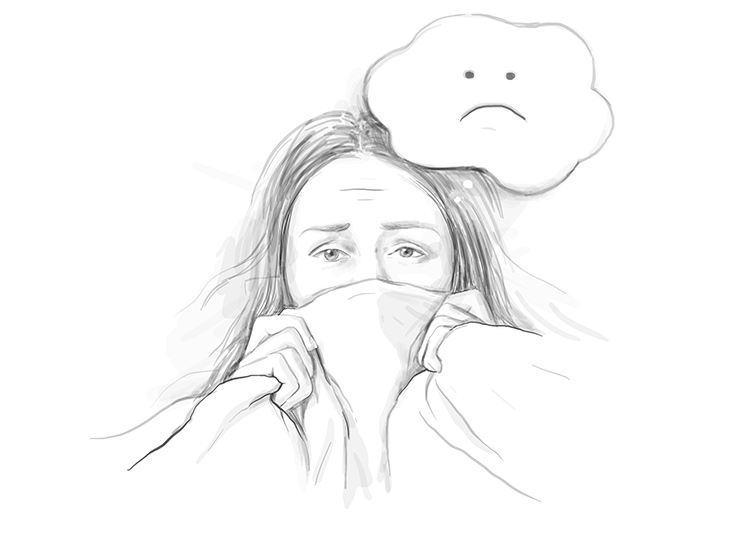
"The mind is its own place, and in itself can make a heaven of hell, a hell of heaven.." - John Milton, Paradise Lost
The imagination is a wonderful thing. Except when it's not.
How many times a day would you say you imagine something that makes you feel bad?
5 times? 10 times? More?
What would life be like if you didn't do any of that? What if that time was used to imagine things going well instead?
To counteract this, start to challenge what your imagination throws up at you. "They are all going to hate me! ... Hold on, how do I know that? Some people will like me, some will think I'm okay, and some might be indifferent."
Your imagination may be creative, but it's not always helpful. Not even close.
'Stop Thinking the Worst' is part of our Overcome Fear and Anxiety Pack, in case that's helpful.
28. Why people do - or don't - like you
"We would worry less about what others think of us if we realized how seldom they do." - Ethel Barrett
I'll admit, when I first started public speaking, I'd agonize over whether people would think what I was doing was okay, desperately hope they'd like it, and sometimes imagine they didn't.
Now I don't bother; that's way too much work. It's not that I assume people will like me or what I have to say, it's that I've learned to relax with just not knowing.
Some 'problems' in life, such as not really knowing for sure what others think of us, are not really meant to be solved.
How people perceive you may have more to do with them than you anyway. They may even like or dislike you merely because you've triggered an association in their minds and reminded them of someone they liked (or didn't like) from their past.
That has nothing to do with you. Stop Worrying.
29. How to Be Yourself
People say "be yourself" don't they? But they never say how.
Firstly, remember it's human to mimic other humans. We especially see this in young adults, when they suddenly seem to adopt the accent, clothes, and persona of other young adults or perhaps a particular celebrity. But all you ultimately can be is...yourself.
Trying to be someone you are not will always leave you feeling unfulfilled, however much you admire that person. It's curious that we tend to try to adopt the outward appearance or behaviour of people who themselves are comfortable being individualistic.
To really copy them, we'd need to develop our own individuality and in that way, we'd seem to be less like them whilst actually being more like them (answers on the back of a postcard as to whether that made sense or not).
We all have quirks, unique perspectives, and idiosyncrasies. The more relaxed we become with our own differences, the more comfortable we start to feel just being ourselves.
So to be yourself, you first need Self Acceptance, then you can try Being Yourself.
30. Are you giving others a chance?
Do you remember my client John from a few tips back? Who couldn't bring himself to pursue his dream of opening a small hotel in Spain because of what people might think?
Well at one point during our therapy, I suddenly said to John: "What makes you think you're so much better than other people!"
He looked taken aback. "I don't, that's the whole point!"
"But you've already told me that you like to see the best in others; yet you assume other people always look to see the worst in you!"
He looked very thoughtful at this. Worrying that other people will think us stupid, ugly, pathetic, or un-cool is to do those people a disservice. Many people will judge you fairly and give you the benefit of the doubt - so give them the benefit of the doubt
When you really, truly, get this, it can revolutionize how you feel about yourself, and other people. So please, take a few moments now to absorb it.
Oh, and in case you were wondering, John realized he wouldn't live forever and, the last I heard, he was loving his life in Spain.
31. Try emergency thinking!
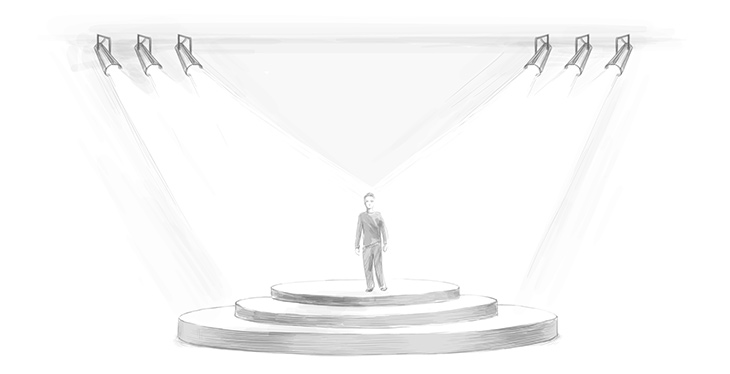
Consider this...
If you were delivering life-saving mouth-to-mouth on someone in public, you'd be totally focussed.
You wouldn't be thinking about what onlookers thought of your clothes or your body shape or the colour of your eyes. All that fluff would disappear from your consciousness.
When you are impassioned and fascinated, say by a conversation you're having, then you tend to forget to bother to imagine what others may be thinking of you.
To feel what I mean, try this self hypnotic exercise:
- Think about times when you are tempted to worry what others think about you.
- Now think of times when you are totally focussed - maybe on a sports game or piece of music or reading a book, or talking with a friend when they're telling you something amazing. Now notice that feeling of being totally focussed outside of yourself.
- Amplify that feeling.
- Take that feeling of outer focus into the imagined situation from Step 1 (where before you'd have been worrying about what others might be thinking).
- Experience being in the formally self conscious situation and feeling relaxed and unconcerned about what others may or may not be thinking.
- Notice what it's like to reach the point where you no longer even think about what others might be thinking.
This is the sort of exercise we use in the 10 Steps to Solid Self Esteem course.
Sometimes, ignoring the bigger picture is a good thing.
32. What the snake can teach you about being too nice

The snake was vicious, snarling, and dangerous. He terrified the villagers, biting the children and scaring all the adults. But sometimes he felt lonely and craved companionship.
One day, a wise man wandered into the village. He clearly saw the chaos the snake's actions had brought.
Because this is a story and he was wise, he could speak to the snake and, on gaining the reprobate's trust, said, "Listen up, snake. You're not only making the people here unhappy, but you yourself are clearly miserable.
Practice some kindness and gentleness to improve the lot of everyone here, including you."
And so the wise man went on his way.
Years later, the wise one happened to pass again through that same village. To his surprise, he saw an inert, passive plaything being kicked by the children. He realized that this was, in fact, none other than the formally aggressive serpent he'd had words with years before. The snake managed to free himself from his tormentors and slide up to the man.
"Your advice was disastrous!" he hissed faintly. "Practicing gentleness has brought me complete misery! Now I'm used as a toy, laughed at, and taken for granted. I was better off before!"
The old man replied, "You took my advice too literally and without reflection. I said that you shouldn't bite... but I didn't say you should never hiss!"
I don't know if being too nice to others is a problem for you, but in my experience helping people with low self esteem, it often is.
If it is, then Stop Being Too Nice may well help you get your hiss back.
33. How to avoid devaluing yourself
We saw above how the snake had made life difficult for itself by becoming too nice. This time I want to look at how people respond to too much niceness.
Have you noticed that when something is too available, its perceived value drops?
We take water for granted when it's gushingly plentiful, but it becomes more valued than gold during severe drought.
In the same way, when someone is reliably nice, their niceness loses value because it's so plentiful. But when someone is sometimes but not always 'nice', we value their niceness as a scarce resource.
We are more likely to become addicted to gambling (or anything) when the rewards from that behaviour are inconsistent. If gamblers won every time, the act of gambling would, believe it or not, become less compelling for them and feel less meaningful.
Don't blame me; I didn't invent human nature! (Although, this principle holds good for other animals, too).
It's worth thinking about in case you're ever tempted to think "all I have to do is to be nicer to them and they'll like me".
34. How to Stop Being Too Nice

So we've talked quite a bit about the risks of being too nice.
So what are we to make of it all? Well, if we are not to be taken advantage of at work or in relationships, becoming more assertive will help.
At work, I think people should be consistently nice to clients and customers as part of showing professionalism; but not to the point that they are abused like our friend the snake from 2 emails back.
The opposite of being horrible isn't to be too nice (unless you think as simplistically as the snake).
The snake wasn't really being nice after he'd misapplied the wise man's advice. I say this because the effect of his niceness was to make the children worse people. The kids had become cruel, disrespectful, and insensitive. Being too nice can deny others the chance to behave well.
The antidote to TNS ('Too Nice Syndrome') isn't to become a vicious curmudgeon (Ebenezer Scrooge wasn't the most popular guy on the block), but simply to remember how to 'hiss' sometimes. 'Cruel to be kind' is not a new idea.
Other tips on not appearing too nice include:
- Be prepared to upset other people sometimes. It might even do them good.
- Don't always put yourself last, because pretty soon others will do so, too.
- Have your own point of view without always waiting to see what others think.
- Don't always say yes to everything immediately. If something is really not okay with you, say no. Or let people know it's something you're going to have to consider carefully.
We should treat others well, avoid selfishness when we can, and be considerate and decent, but never be pushed around or taken advantage of. And when you need to hiss... then hiss!
Here's a little help: 10 Steps to Absolute Assertiveness.
That's all on being too nice for now, I hope it's been helpful.
35. Overcome fear of confrontation

Here's a problem you've probably come across: someone's being mean to you. What do you do?
It's weird. Low self esteem fools people into believing their own needs don't matter. You might even feel more comfortable sticking up for other people but not for yourself.
Fear and habit stops you saying what you should say to someone. But you'll find good self esteem enables you to be comfortable with confrontation. But it works the other way too. Getting comfortable with confrontation raises your self esteem. That's a great win/win.
We've talked about being too nice but how about actually deciding to confront someone over something you need?
How to confront someone
- Decide whether it's something that you really feel needs addressing. We can all be tolerant up to a point. Don't feel you have to confront over everything but when it really matters then let them know it.
- Stick absolutely and only to the facts. Tell them what is bothering you without insults or apologies.
- Don't make excuses for them. You've done too much of that.
- Don't apologise.
- Keep the conversation insult free. Focus on the behaviour.
- If they insult you remind them you need an adult conversation.
- Let them know why you are unhappy, clearly what is wrong.
- Let them know what needs to change in future and why that will be better.
- Seek agreement and focus on the issue, not on how awful they are.
- If they shout or scream remind them that you want an adult conversation.
- And above all stay calm.
You might like to try the session Overcome Fear of Confrontation.
36. Stop fear of failure from wrecking your life
"Our doubts are traitors, and make us lose the good we oft might win by fearing to attempt." - William Shakespeare
Do you sometimes fear failure too much to even try things? Fear of failure is closely linked to fear of rejection and the dread of being thought poorly of.
Anyone can create an excuse not to do anything, no matter how potentially valuable and rewarding it would be if you did do it. It's just whether you choose to believe those excuses.
Indecisiveness may be just another unconscious 'tactic' to protect you from trying. After all if you don't try, you don't 'fail' right? Only not trying is a kind of failure anyway, and deep down we all know that.
Decide today to have the courage to go for something you want.
"Whatever you can do, or dream you can do, begin it. Boldness has genius, power, and magic in it. Begin it now." - Johann Wolfgang von Goethe
You might like to listen to the session Overcome Fear of Failure.
Next time I'll give you some ideas to help you go for what you want more of.
37. How to be successful: The theory of relativity explained in 30 seconds

I was talking above about fear of failure which is also another way of describing fear of success.
Low self esteem cons you into feeling like you are 'a failure'. But to be 'a success' we need to get beyond simplistic notions of 'success' or 'failure'.
Why?
Because failure is a relative term.
Look at it this way;
If I take a degree in Spanish, I might study for a few years and pick up lots of great Spanish. But what if, for some reason I don't actually finish the degree?
Is this a total failure? Or is it a partial success? I might, as a result of that study, now be able to chat fluently in Spanish (relative success) but I don't have my degree (relative 'failure').
If I suffer from perfectionism I may not 'convert' the relative part of the success and feel myself to be a 'total failure!'
If a relationship 'failed' then we can see that as 'total failure' or maybe not. Because you had that relationship you learned lots of useful things which will help your future relationships - that is a kind of success - in the long term anyway.
A failure on one level is often a success on another, when we're less black-or-white about it.
The Scottish pharmacologist Sir Alexander Fleming succeeded in accidentally discovering penicillin (which has indirectly saved hundreds of millions of lives) through failing to clear away cultures of staphylococci on a bench in a corner of his laboratory.
Failing in school might be the catalyst for a successful career in art, who knows?
Loosen up your thinking around what constitutes 'success' and 'failure' and both fear of failure and fear of success will evaporate helping you be braver about what you try.
(Check out the Overcome Fear of Success session - it can help you feel much more relaxed about going for what you want.)
38. What is your success?
Legend has it 2,500 years ago The Buddha sat under a certain tree and eventually achieved spiritual enlightenment. Yet years before that he had done what many at the time assumed was crazy. He'd forsaken wealth and princely status to wander in poverty. His father thought he was crazy, his peers thought he was crazy. If you tried to do this today, the modern world would think you were crazy.
He went his own way.
What has this got to do with your success? The answer: 'Your success needs to be your success.
Fear of failure so often means fear of not fulfilling other people's expectations (or what you imagine their expectations to be). But I want you to follow your own deep down ideas for success.
Here's a question: What does 'success' mean to you? If it fits with what other people assume is 'successful' then that's fine..but maybe it doesn't and that needs to be fine too.
Maybe deep down you want to help the world and make a bit of money. Perhaps for you 'success' means living each day with a sense of meaning and purpose or having a healthy mind and body or buying a place in the sun, or all these things and more. Maybe falling and staying in love is important for you or writing a book, or composing and playing music or travelling or starting something new that helps the world or something entirely different I haven't mentioned.
For many, success has come to mean the acquisition of wealth, but we know that gaining more and more money above a reasonable level doesn't make us increasingly happier. Really think about what you would feel to be successful and bear in mind it might not look like success to some others.
After all, it's your life. If you feel like you have and do live your life almost entirely by what you feel others expect of you then you are not living your life at all.
The Think for Yourself session can really help.
39. Be bold, take action
"If you don't make mistakes you don't make anything"
It's a cliche that those who succeed are often the ones who are prepared to 'fail' the most. The more you try by the law of averages, you are more likely to succeed.
Get into the habit of seeing how much you can 'fail' at. Take classes, learn something, try new things; it's a numbers game. Put yourself out there and get used to attempting things without too much thought of 'success' or 'failure'. The most successful people are often just the ones who try the most things.
What people forget is that to speed up your rate of success, you need to quicken your rate of failure. And if you predict you'll fail at something and then you do, you'll have actually succeeded in your prediction. The more you try at things the more normal it's going to feel to say 'yes' to life and the more you'll gain in the long run even if sometimes it looks like 'failure.'
To help you treat life as an adventure, we have a great session: Try New Things.
40. Why you should be successful

have you ever felt you didn't 'deserve' success?
You didn't feel able to 'push yourself forward' in life?
Low self esteem convinces people to not try, partly because if you don't try you won't 'fail' but also because somewhere along the way you learned (or mislearned) that, well who are you to raise up above the rest?
But I want you to consider this:
I want you to forget about you being successful and think about situations being successful. Your success is never just your success because good things spread and when you help yourself you inevitably help others too.
If I play the guitar well in company it's not me being successful so much as me serving the situation so that the situation is successful. You gaining prominence in some way can be your way of giving to, not taking from the world.
And if you need some help going after what you really want (to help others too) then you might like to use the Personal Motivation Pack.
41. Why you're beyond criticism
Does someone keep criticising you? Relentless criticism wears you down and if you've been prone to low self esteem then you may have found yourself internally agreeing with the critic. If this happens you criticise yourself every time someone else criticises you! Low self esteem has us siding with those who treat us badly! But you can get way beyond this.
How? By remembering that a criticism is always a lie. How can I even say this?
Because by definition criticism is different from a complaint. If someone complains about you that may be justified, but a criticism is untrue because:
- It attacks all of who you are ("You are a lazy !£@* because you forgot to buy milk!")
- It is global in that it implies you are like this in all ways.
- It is permanent because it implies you have always been like this and always will be like this.
Complaint: "I'm upset because you didn't buy the milk like you said you would today."
(Doesn't attack your whole personality but refers to something you forgot to do, talks about 'today' so isn't implying permanence and focussed on one action - or lack of - which is specific not global).
Criticism: "You didn't buy the milk; you're just so lazy and useless!
(One specific incident is spread to apply to your whole identity - past present and future - and with the implication that you are always 'lazy' and 'useless' in all areas.)
A criticism is always such an exaggeration (which may have a seed of a complaint within it) that it can never be 'true.' Know the difference between a criticism and a complaint and never feel you have to accept a criticism. If you've had low self esteem, chances are you've been criticised more than enough.
And in case you need more help with I can recommend the How to Deal with Negative Critics session.
42. Never give up!

Ever heard of Gresham's law? It's the economic principle that 'bad money drives out good money'. And bad feelings can drive out good ones and bad thoughts drive out good ones. And when you've had years of that it all starts to feel like a habit. But it's also true to say that good feelings and thoughts will start to drive out the bad ones.
In fact what you've been learning doesn't even require feeling great or thinking 'positively' just more objectively and fairly. Don't give up, in fact never give up.
Determination and perseverance make for more successful and ultimately happier lives.
And if you need it you can always benefit from the Develop Perseverance session.
Continue reading below to extend the idea of what is possible for you.
Let Sir Roger Bannister help you now
"You are not meant for crawling, so don't. You have wings. Learn to use them, and fly." - Rumi 13th century
Ever heard of the 'Bannister Effect'? Before 6 May 1954, it was thought 'impossible' to run a mile under four minutes. All kinds of experts claimed no human body could ever go quicker than 4 minutes. So how did they explain that on that date one Dr (now 'Sir') Roger Bannister did the very thing that 'experts' across the world had said was not possible! Shock, horror he ran a mile under 4 minutes - 3 minutes and 59.4 seconds to be precise.
However, it wasn't the physical barrier, but the psychological one we refer to when we describe the 'Bannister Effect'. Now really think about this:
In the 12 months after Bannister's historic run, 37 more runners broke the four-minute mile, and in the 12 months after that, another 300 did it!
All athletes who presumably could have run that fast before Bannister's run! So why didn't they? Because they didn't know it was possible. Don't let people tell you, you can't do things. Always remember the Bannister effect and how it can be little more than a limiting popular delusion.
43. Forget about 'believing in yourself'
here's a thought I think you'll find helpful. You don't have to think about believing in yourself when you do believe in yourself and you don't have to try to be positive when you are positive.
(You might need to read over that sentence a few times!)
Here's an example to show you what I mean;
When you're really fascinated by something or intrigued to see how far you can take something you don't have to divert time or energy into desperately 'believing in yourself', or 'being positive' because your focus is not on yourself.
I recommend the use of hypnosis as part of the approach to become fairer with yourself because hypnosis helps your self belief, resilience and optimism work in the 'background' of your mind or, in other words, 'unconsciously'.
When you do believe in yourself you don't have to think about believing in yourself.
You just do.
44. How not to be emotionally insecure
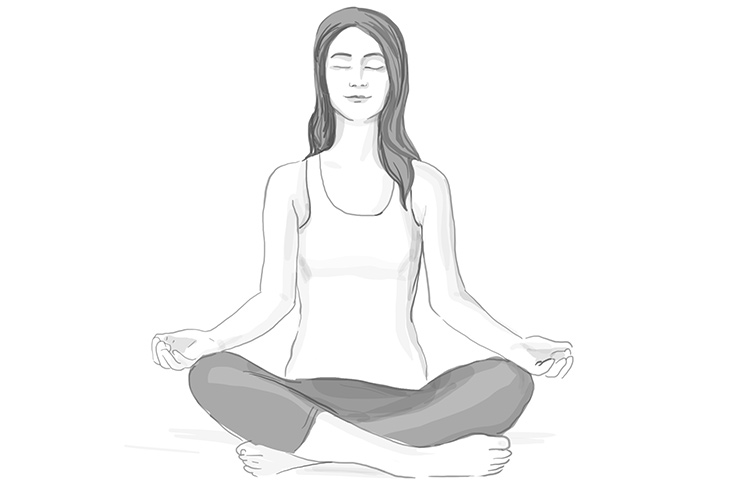
You don't know what's going to happen - so relax. Low self esteem makes you presume too much about the future but here's a secret: so does 'positive thinking'. Really emotionally secure people don't assume things have to go well. Neither do they assume that something is bound to be 'a disaster' So what's their secret?
They have learned to relax with not knowing. They can tolerate, even thrive on uncertainty. This might not sound amazing but once you can do it in relationships, in work, in all types of situations; you instantly become more emotionally secure.
That's because emotional insecurity has us 'having to know' that so and so loves us, or the relationship is going to work or that people like us or that some event will go well. But when you let go of having to know; something wonderful happens. You become truly self assured with the feeling that 'I don't know what's going to happen here, I'll do all I can do to make it work but whatever happens I will be fine'. The capacity to relax more with uncertainty is part of what really healthy self esteem and self confidence is all about.
If you need it you can use the Living with Uncertainty session.
That's it! Did you find these tips useful?
If you are still struggling with low self esteem, our 10 Steps to Solid Self Esteem course can help.
10 Steps to Solid Self Esteem course
Vanquish that critical inner voice and discover how much easier and happier life is with healthy levels of self esteem...

